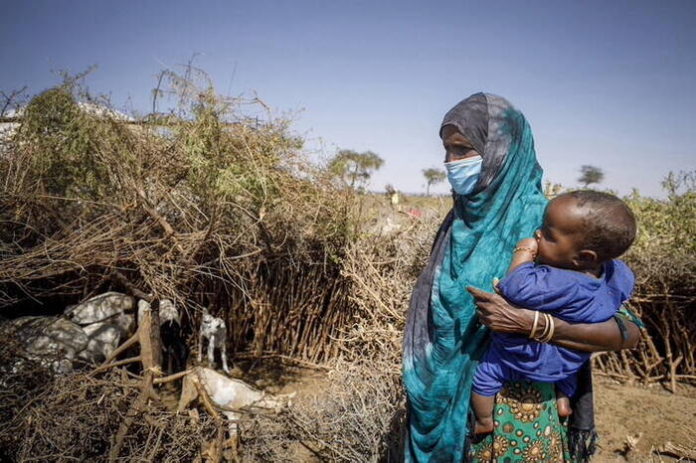The United Nations World Food Programme (WFP), the UN Refugee Agency (UNHCR) and the Ethiopian Government Refugees and Returnees Service (RRS) this week appealed for US$73 million to provide food rations to over 750000 refugees in Ethiopia, over the next six months.
The WFP will run out of food for refugees by next month, leaving vulnerable families who are dependent on food assistance at risk of under-nutrition, micronutrient deficiency, susceptibility to diseases or infection and increased protection risks, the three agencies warn.
“Due to protracted funding shortfalls, WFP has already been forced to cut rations for 750,000 registered refugees living in 22 camps and five sites in hosting communities in Afar, Amhara, Benishangul-Gumuz, Gambella, Somali and Tigray regions of Ethiopia,” a statement issued this said.
“Food rations for refugees in Ethiopia were first reduced by 16% in November 2015, by 40% in November 2021, and by 50% in June 2022. Food insecurity amongst the refugees has risen as a result of the cuts and is even further compounded by current global limitations to food availability, economic shocks, rising costs of food and energy, the fallout of COVID-19, conflict and insecurity.”
To understand the impact of ration cuts on the food security and socio-economic situation of refugees, WFP, UNHCR and RRS conducted a rapid assessment in April which was based on 1,215 households residing in camps located in Afar, Beneshangul-Gumuz, Gambella, and Somali regions.
The results show that more households continued to adopt negative coping strategies by reducing the number of meals eaten in a day, consuming less expensive or less preferred foods, or limiting the portion of the meals served.
More households reported to have engaged in demeaning activities, including engaging children in income generation activities, the collection and sale of firewood, while several borrowed cash, relying on friends/relatives for food. This forces refugees to rely on the resources of the hosting community and environment they live in which also increases the likelihood of resource-based conflicts between refugees and host communities.
“Three quarters of a million refugees will be left with nothing to eat in just a matter of weeks unless we receive funding immediately,” Claude Jibidar, WFP’s Representative and Country Director for Ethiopia said.
“The priority for us all must be to restore assistance to at least minimum levels for refugees, all of whom are solely reliant on WFP’s cash and food assistance for survival.”
“We have a shortfall of US$73 million for refugees’ minimum needs and we are deeply concerned that if funding cuts continue, they may consider returning to their places of origin when it is unsafe.”
If there is an immediate response from donors, WFP will be able to buy food available in the region and transport it to meet the dietary needs of the refugees. WFP will also transfer cash to the refugees which gives them the choice of how to meet their immediate needs and stimulates local markets.
“We are very concerned about the lack of food for refugees. The continued lack of full rations for refugees, coupled with the impact of the most severe drought that the country has experienced in over 40 years, will greatly undermine the gains made in refugee protection and risk impacting the peaceful co-existence between refugees and their host communities,” said UNHCR’s Deputy Representative in Ethiopia, Margaret Atieno. “We are grateful for what donors have provided so far, but more funding is needed quickly.”
RRS Director General, Tesfahun Gobezay added: “Ethiopia, with its progressive refugee policy and commitments, has been striving to ensure the sustainable self-reliance of refugees and host communities with its scarce resources, struggling with recurrent funding gaps from the international community.
“The subsequent deduction of the overall humanitarian assistance fund for refugees in Ethiopia in recent years has not only affected the immediate basic needs of refugees, but also hindered the long-term intended sustainable self-reliance and co-existence of refugees and host communities.”








